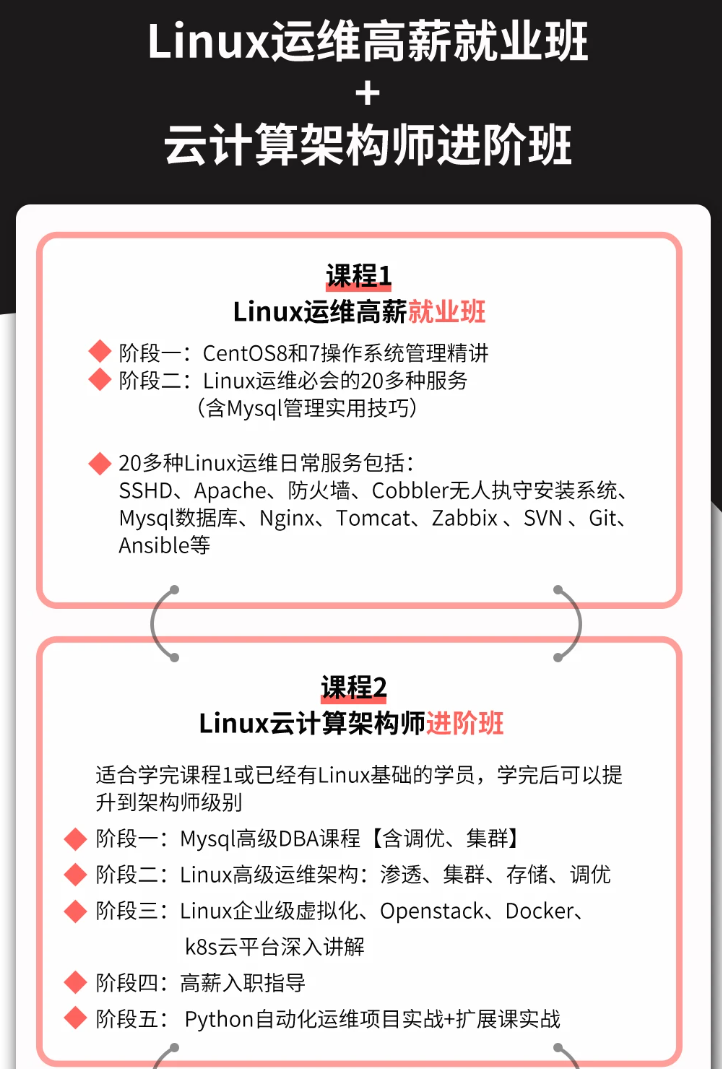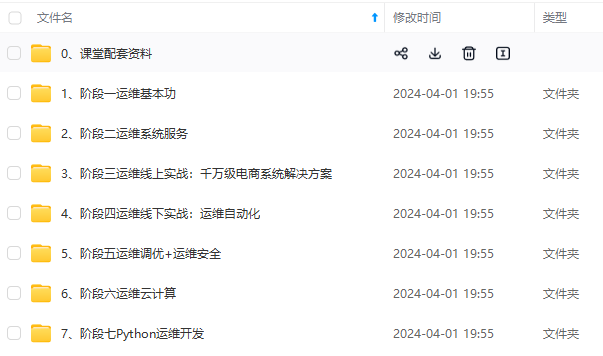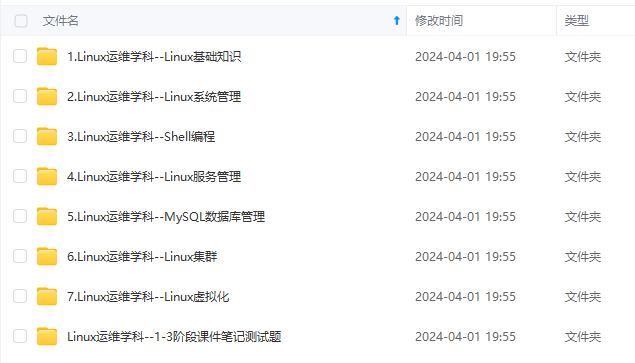先自我介绍一下,小编浙江大学毕业,去过华为、字节跳动等大厂,目前在阿里
深知大多数程序员,想要提升技能,往往是自己摸索成长,但自己不成体系的自学效果低效又漫长,而且极易碰到天花板技术停滞不前!
因此收集整理了一份《2024年最新Linux运维全套学习资料》,初衷也很简单,就是希望能够帮助到想自学提升又不知道该从何学起的朋友。





既有适合小白学习的零基础资料,也有适合3年以上经验的小伙伴深入学习提升的进阶课程,涵盖了95%以上运维知识点,真正体系化!
由于文件比较多,这里只是将部分目录截图出来,全套包含大厂面经、学习笔记、源码讲义、实战项目、大纲路线、讲解视频,并且后续会持续更新
// The operations waiting on the timer.
//该定时器定时时间到的时候需要执行的op操作
op_queue<wait_op> op_queue_;
// The index of the timer in the heap.
std::size_t heap_index_;
// Pointers to adjacent timers in a linked list.
//把timer链接在一起组成双向链表,加入到timers\_头部
per_timer_data\* next_;
per_timer_data\* prev_;
};
private:
//…
// The head of a linked list of all active timers.
//所有的timer定时器都通过给链表链接在一起(双向链表)
per_timer_data\* timers_;
//每个timer有2个成员,一个记录时间,一个记录timer的私有数据
struct heap\_entry
{
// The time when the timer should fire.
//time\_traits.hpp中定义typedef boost::posix\_time::ptime time\_type;
//记录定时器某个时间点过期
time_type time_; //也就是posix\_time::ptimet
// The associated timer with enqueued operations.
//记录本timer的一些私有数据
per_timer_data\* timer_;
};
// The heap of timers, with the earliest timer at the front.
//每个timer对应一个heap\_entry节点,方便更加heap\_entry.heap\_进入快速排序,目的是可以快速定位那个timer到期
std::vector<heap_entry> heap_;
};
可以看到在这个time\_queue中,per\_timer\_data以两种方式维护,在per\_timer\_data类中是一个双向链表,表头就是timers\_,另一个是最小堆,就是heap\_。
这样设计的原因:用双向链表维护可以保证添加定时器的顺序性,而最小堆是以定时器触发的事件维护的,堆首的定时器将是最快触发的
### 从示例程序看源码
首先来看看当我们写下如下代码时具体发生了什么:
/**
* @brief 测试同步定时器
*/
#include
#include <boost/asio.hpp>
#include <boost/date_time/posix_time/posix_time.hpp>
inline int64_t GetCurrentTime()
{
struct timespec ts;
clock_gettime(CLOCK_REALTIME, &ts);
return ts.tv_nsec + ts.tv_sec * 1000000000ULL;
}
int main() {
boost::asio::io_service io;
boost::asio::deadline_timer t(io, boost::posix_time::seconds(5));
std::cout << "ts1: " << GetCurrentTime() << std::endl;
std::cout << t.expires_at() << std::endl;
t.wait();
std::cout << "ts2: " << GetCurrentTime() << std::endl;
std::cout << “Hello, world!” << std::endl;
return 0;
}
// output:
// ts1: 1677602292636395453
// 2023-Feb-28 16:38:17.636309
// ts2: 1677602297641368114
// Hello, world!
**抽出看boost::asio::deadline\_timer t(io, boost::posix\_time::seconds(5))执行**
(gdb) s
boost::asio::basic_deadline_timer<boost::posix_time::ptime, boost::asio::time_traitsboost::posix_time::ptime, boost::asio::deadline_timer_service<boost::posix_time::ptime, boost::asio::time_traitsboost::posix_time::ptime > >::basic_deadline_timer (this=0x7fffffffdd80, io_service=…,
expiry_time=…) at /root/3rd/boost_1_62_0/boost/asio/basic_deadline_timer.hpp:184
184 : basic_io_object(io_service)
(gdb) l
179 * @param expiry_time The expiry time to be used for the timer, relative to
180 * now.
181 /
182 basic_deadline_timer(boost::asio::io_service& io_service,
183 const duration_type& expiry_time)
184 : basic_io_object(io_service)
185 {
186 boost::system::error_code ec;
187 this->service.expires_from_now(this->implementation, expiry_time, ec);
188 boost::asio::detail::throw_error(ec, “expires_from_now”);
(gdb) bt
#0 boost::asio::basic_deadline_timer<boost::posix_time::ptime, boost::asio::time_traitsboost::posix\_time::ptime, boost::asio::deadline_timer_service<boost::posix_time::ptime, boost::asio::time_traitsboost::posix\_time::ptime > >::basic_deadline_timer (this=0x7fffffffdd80,
io_service=…, expiry_time=…) at /root/3rd/boost_1_62_0/boost/asio/basic_deadline_timer.hpp:184
#1 0x000000000041889f in main () at test_deadline_timer.cpp:17
(gdb) p io_service
$1 = (boost::asio::io_service &) @0x7fffffffddc0: {boost::asio::detail::noncopyable = {}, service_registry_ = 0x653f40,
impl_ = @0x653c20}
(gdb) s
boost::asio::basic_io_object<boost::asio::deadline_timer_service<boost::posix_time::ptime, boost::asio::time_traitsboost::posix_time::ptime >, false>::basic_io_object (this=0x7fffffffdd80, io_service=…) at /root/3rd/boost_1_62_0/boost/asio/basic_io_object.hpp:91
91 : service(boost::asio::use_service(io_service))
(gdb) l
86 /*
87 * Performs:
88 * @code get_service().construct(get_implementation()); @endcode
89 */
90 explicit basic_io_object(boost::asio::io_service& io_service)
91 : service(boost::asio::use_service(io_service))
92 {
93 service.construct(implementation);
94 }
95
(gdb) n
93 service.construct(implementation);
(gdb) p implementation
$2 = {boost::asio::detail::noncopyable = {},
expiry = {<boost::date_time::base_time<boost::posix_time::ptime, boost::date_time::counted_time_system<boost::date_time::counted_time_repboost::posix_time::millisec_posix_time_system_config > >> = {<boost::operators_impl::less_than_comparable<boost::posix_time::ptime, boost::operators_impl::equality_comparable<boost::posix_time::ptime, boost::posix_time::ptime, boost::operators_impl::operators_detail::empty_baseboost::posix_time::ptime, boost::operators_impl::operators_detail::false_t>, boost::operators_impl::operators_detail::empty_baseboost::posix_time::ptime, boost::operators_impl::operators_detail::true_t>> = {<boost::operators_impl::less_than_comparable1<boost::posix_time::ptime, boost::operators_impl::equality_comparable<boost::posix_time::ptime, boost::posix_time::ptime, boost::operators_impl::operators_detail::empty_baseboost::posix_time::ptime, boost::operators_impl::operators_detail::false_t> >> = {<boost::operators_impl::equality_comparable<boost::posix_time::ptime, boost::posix_time::ptime, boost::operators_impl::operators_detail::empty_baseboost::posix_time::ptime, boost::operators_impl::operators_detail::false_t>> = {<boost::operators_impl::equality_comparable1<boost::posix_time::ptime, boost::operators_impl::operators_detail::empty_baseboost::posix_time::ptime >> = {<boost::operators_impl::operators_detail::empty_baseboost::posix_time::ptime> = {}, }, }, }, }, time_ = {time_count_ = {value_ = 9223372036854775806}}}, }, might_have_pending_waits = false,
timer_data = {op_queue_ = {boost::asio::detail::noncopyable = {}, front_ = 0x0, back_ = 0x0}, heap_index_ = 4295771,
next_ = 0x0, prev_ = 0x0}}
(gdb) ptype implementation
type = struct boost::asio::detail::deadline_timer_service<boost::asio::time_traitsboost::posix_time::ptime >::implementation_type
: private boost::asio::detail::noncopyable {
boost::asio::detail::deadline_timer_service<boost::asio::time_traitsboost::posix_time::ptime >::time_type expiry;
bool might_have_pending_waits;
boost::asio::detail::timer_queue<boost::asio::time_traitsboost::posix_time::ptime >::per_timer_data timer_data;
}
这里的get\_service就得到了我们前面提到的basic\_io\_object(basic\_deadline\_timer的父类)中的service\_成员,即该定时器的服务类。expires\_from\_now,甚至包括其它的expires\_XXX都是获取或者修改这个定时器的时间信息,也就是存取我前面所说的数据对象implementation\_(跟service\_放一起的)
throw\_error的写法贯穿于整个asio,不同于往常我们习惯的try-catch写法,这里采用的类似于errno的写法,许多操作函数都需要传入一个error\_code对象,返回时会重新初始化该对象,如果该对象非空则会抛出异常。
basic_deadline_timer(asio::io_context& io_context,
const duration_type& expiry_time)
: basic_io_object<ASIO_SVC_T>(io_context)
{
asio::error_code ec;
this->get_service().expires_from_now(
this->get_implementation(), expiry_time, ec);
asio::detail::throw_error(ec, “expires_from_now”);
}
inline void throw_error(const asio::error_code& err,
const char* location)
{
if (err)
do_throw_error(err, location);
}
#### 同步调用——wait
(gdb) bt
#0 0x00007ffff5f24b23 in __select_nocancel () from /lib64/libc.so.6
#1 0x000000000041b74b in boost::asio::detail::socket_ops::select (nfds=0, readfds=0x0, writefds=0x0, exceptfds=0x0, timeout=0x7fffffffdca0,
ec=…) at /root/3rd/boost_1_62_0/boost/asio/detail/impl/socket_ops.ipp:1780
#2 0x0000000000425daa in boost::asio::detail::deadline_timer_service<boost::asio::time_traitsboost::posix\_time::ptime >::do_waitboost::posix\_time::time\_duration (this=0x653d28, timeout=…, ec=…) at /root/3rd/boost_1_62_0/boost/asio/detail/deadline_timer_service.hpp:212
#3 0x0000000000424b07 in boost::asio::detail::deadline_timer_service<boost::asio::time_traitsboost::posix\_time::ptime >::wait (this=0x653d28,
impl=…, ec=…) at /root/3rd/boost_1_62_0/boost/asio/detail/deadline_timer_service.hpp:171
#4 0x0000000000421edf in boost::asio::deadline_timer_service<boost::posix_time::ptime, boost::asio::time_traitsboost::posix\_time::ptime >::wait (this=0x653d00, impl=…, ec=…) at /root/3rd/boost_1_62_0/boost/asio/deadline_timer_service.hpp:135
#5 0x000000000041e578 in boost::asio::basic_deadline_timer<boost::posix_time::ptime, boost::asio::time_traitsboost::posix\_time::ptime, boost::asio::deadline_timer_service<boost::posix_time::ptime, boost::asio::time_traitsboost::posix\_time::ptime > >::wait (this=0x7fffffffdd80)
at /root/3rd/boost_1_62_0/boost/asio/basic_deadline_timer.hpp:458
#6 0x0000000000418921 in main () at test_deadline_timer.cpp:20
正如前面所说,basic\_deadline\_timer自己是干不了啥事的,还是得调用deadline\_timer\_service的接口方法:
// basic_deadline_timer
void wait()
{
asio::error_code ec;
this->get_service().wait(this->get_implementation(), ec);
asio::detail::throw_error(ec, “wait”);
}
// deadline_timer_service
void wait(implementation_type& impl, asio::error_code& ec)
{
time_type now = Time_Traits::now();
ec = asio::error_code();
while (Time_Traits::less_than(now, impl.expiry) && !ec)
{
this->do_wait(Time_Traits::to_posix_duration(
Time_Traits::subtract(impl.expiry, now)), ec);
now = Time_Traits::now();
}
}
//deadline_timer_service中wait–>do_wait
template
void do_wait(const Duration& timeout, asio::error_code& ec)
{
#if defined(ASIO_WINDOWS_RUNTIME)
std::this_thread::sleep_for(
std::chrono::seconds(timeout.total_seconds())
+ std::chrono::microseconds(timeout.total_microseconds()));
ec = asio::error_code();
#else // defined(ASIO_WINDOWS_RUNTIME)
::timeval tv;
tv.tv_sec = timeout.total_seconds();
tv.tv_usec = timeout.total_microseconds() % 1000000;
socket_ops::select(0, 0, 0, 0, &tv, ec);
#endif // defined(ASIO_WINDOWS_RUNTIME)
}
// The queue of timers.
timer_queue<Time_Traits> timer_queue_;
// The object that schedules and executes timers. Usually a reactor.
timer_scheduler& scheduler_;
};
其实源码已经很好理解了,用了类似pthread\_cond\_t条件变量触发的写法,在循环判断内进行阻塞等待操作。
在Linux系统上阻塞等待用的是select的定时机制,这里的select实际上是没有传入任何描述符的。
在windows上使用的是std::this\_thread::sleep\_for方法
#### 异步调用——async\_wait
异步调用相对就复杂一点了,因为要传入回调函数,还需要epoll\_reactor的协助。
首先看basic\_deadline\_timer中的async\_wait函数:
template
BOOST_ASIO_INITFN_RESULT_TYPE(WaitHandler,
void (boost::system::error_code))
async_wait(WaitHandler&& handler)
{
// If you get an error on the following line it means that your handler does
// not meet the documented type requirements for a WaitHandler.
BOOST_ASIO_WAIT_HANDLER_CHECK(WaitHandler, handler) type_check;
async_completion<WaitHandler,
void (boost::system::error_code)> init(handler);
this->get\_service().async\_wait(this->get\_implementation(),
init.completion_handler);
return init.result.get();
}
看起来很长,实际上逻辑很简单。第8行的宏函数,实际上就是检验传进来的WaitHandler这个函数是否符合要求,具体代码有点复杂,这里就不贴了,大致思路是采用static\_cast能否正常转化来验证,这里面用到了静态断言。
当然,这个函数的主体还是得去调用deadline\_timer\_service的async\_wait。此外,还有async\_completion的处理,这里引用下async\_completion构造函数的官方注释:
/**
* The constructor creates the concrete completion handler and makes the link
* between the handler and the asynchronous result.
*/
大致意思就是对这个传进来的回调函数进行下处理,再将其与一个异步返回结果进行绑定。颇像future的机制啊。
然而实际上,让我很纳闷的是,在return语句那一行,返回的init.result.get(),这个get()函数实际上是空的…
template
class async_result
{
public:
typedef void type;
explicit async_result(Handler&) {}
type get() {}
};
不知道是不是我理解有误,反正我是没弄懂这写法。。
再看到deadline\_timer\_service的async\_wait:
template
void async_wait(implementation_type& impl, Handler& handler)
{
// Allocate and construct an operation to wrap the handler.
typedef wait_handler op;
typename op::ptr p = { boost::asio::detail::addressof(handler),
op::ptr::allocate(handler), 0 };
p.p = new (p.v) op(handler);
impl.might_have_pending_waits = true;
// shceduler\_是定时器服务的调度器,是epoll\_reactor对象
scheduler_.schedule\_timer(timer_queue_, impl.expiry, impl.timer_data, p.p);
p.v = p.p = 0;
}
op::ptr这一段大致意思应该是对handler这个回调函数进行一层包装,这个包装对象是动态分配的,可以看到p指针最后被清0,因为在schedule\_timer中,该包装对象的负责权已经被托管给传入该函数的deadline\_timer\_service的timer\_queue\_了。因此在异步操作中需要保证对象始终有效,否则异步回调时可能会出现段错误;
在此再补充一下,实际上deadline\_timer\_service有两个成员:
// The queue of timers.
timer_queue<Time_Traits> timer_queue_; // 维护所有的定时器
// The object that schedules and executes timers. Usually a reactor.
timer_scheduler& scheduler_; // deadline_timer_service服务的异步调度器。这里timer_scheduler就是epoll_reacotr
接下来再看schedule\_timer函数:
template <typename Time_Traits>
void epoll_reactor::schedule_timer(timer_queue<Time_Traits>& queue,
const typename Time_Traits::time_type& time,
typename timer_queue<Time_Traits>::per_timer_data& timer, wait_op* op)
{
mutex::scoped_lock lock(mutex_);
if (shutdown_)
{
scheduler_.post_immediate_completion(op, false);
return;
}
bool earliest = queue.enqueue_timer(time, timer, op);//将定时器添加进队列,这个队列是deadline_timer_service的timer_queue_成员
scheduler_.work_started(); //epoll_reactor::work_started
if (earliest)
update_timeout(); // 如果当前定时器的触发时间最早,则更新epoll_reactor的timer_fd
}
void epoll_reactor::update_timeout()
{
if (timer_fd_ != -1)
{
itimerspec new_timeout;
itimerspec old_timeout;
int flags = get_timeout(new_timeout);
timerfd_settime(timer_fd_, flags, &new_timeout, &old_timeout);
return;
}
interrupt();
}
// Notify that some work has started.
//scheduler::post_immediate_completion scheduler::post_immediate_completion
//epoll_reactor::schedule_timer epoll_reactor::start_op
//work_finished和work_started对应 io_context::work::work中调用
void epoll_reactor::work_started() //计数,实际上代表的是accept获取到的链接数
{
++outstanding_work_;
}
前面用于包装回调函数的wait\_handler是wait\_op的子类,而wait\_op是scheduler\_operation的子类。scheduler\_operation代表所有这种回调函数的包装。
需要注意的是这里的scheduler\_不再是前面的scheduler\_了,这里的scheduler\_是epoll\_reactor的成员,是scheduler对象(scheduler就是io\_service的实现类)。
这个函数先判断当前的epoll\_reactor是否处于关闭状态,epoll\_reactor关闭时是不会进行任何异步监听的。如果epoll\_reactor已关闭,则把该操作函数交给scheduler(即io\_service)来处理。具体如何处理我们后面的博客再讲,这个逻辑有点复杂。如果epoll\_reactor处于正常的开启状态,则将该定时器添加到deadline\_timer\_service的timer\_queue\_队列中,然后告诉scheduler(io\_service)有新的任务来了(就是那句scheduler\_.work\_started()),后面scheduler会自动处理。如果当前定时器的触发时间点最早,还要更新epoll\_reactor的定时器。
### 异步定时器示例
/**
* @brief 测试异步定时器
*/
#include
#include <boost/asio.hpp>
#include <boost/asio/steady_timer.hpp>
void callback(const boost::system::error_code&) {
std::cout << “Hello, world!” << std::endl;
}
void callback2(const boost::system::error_code&) {
std::cout << “second call but first run” << std::endl;
}
int main() {
boost::asio::io_service io;
boost::asio::steady_timer st(io);
st.expires_from_now(std::chrono::seconds(5));
st.vim(callback);
boost::asio::deadline_timer dt(io, boost::posix_time::seconds(3));
dt.async_wait(callback2);
std::cout << “first run\n”;
io.run();
return 0;
}
#### gdb异步定时器流程
aysnc_wait 程序调用堆栈
(gdb) bt
#0 boost::asio::detail::epoll_reactor::schedule_timer<boost::asio::detail::chrono_time_traits<std::chrono::_V2::steady_clock, boost::asio::wait_traitsstd::chrono:\_V2::steady\_clock > > (this=0x639d70, queue=…, time=…, timer=…, op=0x63a2a0)
at /root/3rd/boost_1_62_0/boost/asio/detail/impl/epoll_reactor.hpp:52
#1 0x0000000000416b6c in boost::asio::detail::deadline_timer_service<boost::asio::detail::chrono_time_traits<std::chrono::_V2::steady_clock, boost::asio::wait_traitsstd::chrono:\_V2::steady\_clock > >::async_wait<void (*)(boost::system::error_code const&)> (this=0x639d28, impl=…,
handler=@0x7fffffffe240: 0x40ce12 <callback(boost::system::error_code const&)>)
at /root/3rd/boost_1_62_0/boost/asio/detail/deadline_timer_service.hpp:192
#2 0x000000000041506c in boost::asio::waitable_timer_service<std::chrono::_V2::steady_clock, boost::asio::wait_traitsstd::chrono:\_V2::steady\_clock >::async_wait<void (&)(boost::system::error_code const&)> (this=0x639d00, impl=…,
handler=@0x40ce12: {void (const boost::system::error_code &)} 0x40ce12 <callback(boost::system::error_code const&)>)
at /root/3rd/boost_1_62_0/boost/asio/waitable_timer_service.hpp:149
#3 0x0000000000413080 in boost::asio::basic_waitable_timer<std::chrono::_V2::steady_clock, boost::asio::wait_traitsstd::chrono:\_V2::steady\_clock, boost::asio::waitable_timer_service<std::chrono::_V2::steady_clock, boost::asio::wait_traitsstd::chrono:\_V2::steady\_clock > >::async_wait<void (&)(boost::system::error_code const&)> (this=0x7fffffffe2c0,
handler=@0x40ce12: {void (const boost::system::error_code &)} 0x40ce12 <callback(boost::system::error_code const&)>)
at /root/3rd/boost_1_62_0/boost/asio/basic_waitable_timer.hpp:511
#4 0x000000000040cf07 in main () at asio_async_timer_test.cpp:22
run
#0 boost::asio::detail::epoll_reactor::run (this=0x639d70, block=true, ops=…)
at /root/3rd/boost_1_62_0/boost/asio/detail/impl/epoll_reactor.ipp:438
#1 0x0000000000410748 in boost::asio::detail::task_io_service::do_run_one (this=0x639c20, lock=…, this_thread=…, ec=…)
at /root/3rd/boost_1_62_0/boost/asio/detail/impl/task_io_service.ipp:356
#2 0x0000000000410337 in boost::asio::detail::task_io_service::run (this=0x639c20, ec=…)
at /root/3rd/boost_1_62_0/boost/asio/detail/impl/task_io_service.ipp:149
#3 0x0000000000410a7f in boost::asio::io_service::run (this=0x7fffffffe300) at /root/3rd/boost_1_62_0/boost/asio/impl/io_service.ipp:59
#4 0x000000000040cf70 in main () at asio_async_timer_test.cpp:28
(gdb) bt
#0 callback2 () at asio_async_timer_test.cpp:14
#1 0x0000000000419c26 in boost::asio::detail::binder1<void (*)(boost::system::error_code const&), boost::system::error_code>::operator() (
this=0x7fffffffe080) at /root/3rd/boost_1_62_0/boost/asio/detail/bind_handler.hpp:47
#2 0x000000000041947a in boost::asio::asio_handler_invoke<boost::asio::detail::binder1<void (*)(boost::system::error_code const&), boost::system::error_code> > (function=…) at /root/3rd/boost_1_62_0/boost/asio/handler_invoke_hook.hpp:69
#3 0x0000000000418e4b in boost_asio_handler_invoke_helpers::invoke<boost::asio::detail::binder1<void (*)(boost::system::error_code const&), boost::system::error_code>, void (*)(boost::system::error_code const&)> (function=…,
context=@0x7fffffffe080: 0x40ce4c <callback2(boost::system::error_code const&)>)
at /root/3rd/boost_1_62_0/boost/asio/detail/handler_invoke_helpers.hpp:37
#4 0x00000000004183ec in boost::asio::detail::wait_handler<void (*)(boost::system::error_code const&)>::do_complete (owner=0x639c20,
base=0x63a060) at /root/3rd/boost_1_62_0/boost/asio/detail/wait_handler.hpp:70
#5 0x000000000040e9ac in boost::asio::detail::task_io_service_operation::complete (this=0x63a060, owner=…, ec=…, bytes_transferred=0)
at /root/3rd/boost_1_62_0/boost/asio/detail/task_io_service_operation.hpp:38
#6 0x00000000004107cc in boost::asio::detail::task_io_service::do_run_one (this=0x639c20, lock=…, this_thread=…, ec=…)
at /root/3rd/boost_1_62_0/boost/asio/detail/impl/task_io_service.ipp:372
#7 0x0000000000410337 in boost::asio::detail::task_io_service::run (this=0x639c20, ec=…)
at /root/3rd/boost_1_62_0/boost/asio/detail/impl/task_io_service.ipp:149
#8 0x0000000000410a7f in boost::asio::io_service::run (this=0x7fffffffe300) at /root/3rd/boost_1_62_0/boost/asio/impl/io_service.ipp:59
#9 0x000000000040cf70 in main () at asio_async_timer_test.cpp:28
(gdb) bt
#0 callback () at asio_async_timer_test.cpp:10
#1 0x0000000000419c26 in boost::asio::detail::binder1<void (*)(boost::system::error_code const&), boost::system::error_code>::operator() (
this=0x7fffffffe080) at /root/3rd/boost_1_62_0/boost/asio/detail/bind_handler.hpp:47
#2 0x000000000041947a in boost::asio::asio_handler_invoke<boost::asio::detail::binder1<void (*)(boost::system::error_code const&), boost::system::error_code> > (function=…) at /root/3rd/boost_1_62_0/boost/asio/handler_invoke_hook.hpp:69
#3 0x0000000000418e4b in boost_asio_handler_invoke_helpers::invoke<boost::asio::detail::binder1<void (*)(boost::system::error_code const&), boost::system::error_code>, void (*)(boost::system::error_code const&)> (function=…,
context=@0x7fffffffe080: 0x40ce12 <callback(boost::system::error_code const&)>)
at /root/3rd/boost_1_62_0/boost/asio/detail/handler_invoke_helpers.hpp:37
#4 0x00000000004183ec in boost::asio::detail::wait_handler<void (*)(boost::system::error_code const&)>::do_complete (owner=0x639c20,
base=0x63a2a0) at /root/3rd/boost_1_62_0/boost/asio/detail/wait_handler.hpp:70
#5 0x000000000040e9ac in boost::asio::detail::task_io_service_operation::complete (this=0x63a2a0, owner=…, ec=…, bytes_transferred=0)
at /root/3rd/boost_1_62_0/boost/asio/detail/task_io_service_operation.hpp:38
#6 0x00000000004107cc in boost::asio::detail::task_io_service::do_run_one (this=0x639c20, lock=…, this_thread=…, ec=…)
at /root/3rd/boost_1_62_0/boost/asio/detail/impl/task_io_service.ipp:372
#7 0x0000000000410337 in boost::asio::detail::task_io_service::run (this=0x639c20, ec=…)
at /root/3rd/boost_1_62_0/boost/asio/detail/impl/task_io_service.ipp:149
#8 0x0000000000410a7f in boost::asio::io_service::run (this=0x7fffffffe300) at /root/3rd/boost_1_62_0/boost/asio/impl/io_service.ipp:59
#9 0x000000000040cf70 in main () at asio_async_timer_test.cpp:28
`boost::asio::io_service::run` 调用分析
run其实就是一直循环执行do\_one,并且是以阻塞方式进行的(参数为true),而run\_one同样是以阻塞方式进行的,但只执行一次do\_one;poll和run几乎完全相同,只是它是以非阻塞方式执行do\_one(参数为false),poll\_one是以非阻塞方式执行一次do\_one。
run()会以阻塞的方式等待所有异步操作(包括post的回调函数)完成然后返回
run\_one()也会以阻塞的方式完成一个异步操作(包括post的回调函数)就返回。
poll()以非阻塞的方式检测所有的异步操作,如果有已经完成的,或者是通过post加入的异步操作,直接调用其回调函数,处理完之后,然后返回。不在处理其他的需要等待的异步操作。
poll\_one() 以非阻塞方式完成一个异步操作(已经完成的)就立即返回,不在处理其他已经完成的异步操作和仍需等待的异步操作。
// /root/3rd/boost_1_62_0/boost/asio/impl/io_service.ipp:59
std::size_t io_service::run()
{
boost::system::error_code ec;
std::size_t s = impl_.run(ec);
boost::asio::detail::throw_error(ec);
return s;
}
// /root/3rd/boost_1_62_0/boost/asio/detail/impl/task_io_service.ipp:149
std::size_t task_io_service::run(boost::system::error_code& ec)
{
ec = boost::system::error_code();
if (outstanding_work_ == 0)
{
stop();
return 0;
}
thread_info this_thread;
// 本线程私有private_op_queue队列中op任务数,"outstanding_work"表示未完成的工作,并非"杰出"的工作
this_thread.private_outstanding_work = 0;
thread_call_stack::context ctx(this, this_thread);
mutex::scoped_lock lock(mutex_);
std::size_t n = 0;
for (; do_run_one(lock, this_thread, ec); lock.lock())
if (n != (std::numeric_limitsstd::size_t::max)())
++n;
return n;
}
`thead_info`结构的定义:
// Structure containing thread-specific data.
//线程私有队列,该结构中包含一个队列成员
typedef scheduler_thread_info thread_info;
struct scheduler_thread_info : public thread_info_base
{
scheduler::do_wait_one->epoll_reactor::run 获取对应op,
// 最终再通过scheduler::task_cleanup和scheduler::work_cleanup析构函数入队到scheduler::op_queue_
//epoll相关的网络事件任务首先入队到私有队列private_op_queue,然后再入队到全局op_queue_队列,这样就可以一次性把获取到的网络事件任务入队到全局队列,只需要加锁一次
//private_op_queue队列成员的op类型为descriptor_state,
op_queue<scheduler_operation> private_op_queue;
//本线程私有private_op_queue队列中op任务数,"outstanding_work"表示未完成的工作,并非"杰出"的工作
long private_outstanding_work;
};
`thread_call_stack::context`结构:
**网上学习资料一大堆,但如果学到的知识不成体系,遇到问题时只是浅尝辄止,不再深入研究,那么很难做到真正的技术提升。**
**[需要这份系统化的资料的朋友,可以点击这里获取!](https://bbs.csdn.net/forums/4f45ff00ff254613a03fab5e56a57acb)**
**一个人可以走的很快,但一群人才能走的更远!不论你是正从事IT行业的老鸟或是对IT行业感兴趣的新人,都欢迎加入我们的的圈子(技术交流、学习资源、职场吐槽、大厂内推、面试辅导),让我们一起学习成长!**
入队到私有队列private\_op\_queue,然后再入队到全局op\_queue\_队列,这样就可以一次性把获取到的网络事件任务入队到全局队列,只需要加锁一次
//private\_op\_queue队列成员的op类型为descriptor\_state,
op_queue<scheduler_operation> private_op_queue;
//本线程私有private\_op\_queue队列中op任务数,"outstanding\_work"表示未完成的工作,并非"杰出"的工作
long private_outstanding_work;
};
thread_call_stack::context结构:
网上学习资料一大堆,但如果学到的知识不成体系,遇到问题时只是浅尝辄止,不再深入研究,那么很难做到真正的技术提升。
一个人可以走的很快,但一群人才能走的更远!不论你是正从事IT行业的老鸟或是对IT行业感兴趣的新人,都欢迎加入我们的的圈子(技术交流、学习资源、职场吐槽、大厂内推、面试辅导),让我们一起学习成长!























 被折叠的 条评论
为什么被折叠?
被折叠的 条评论
为什么被折叠?








